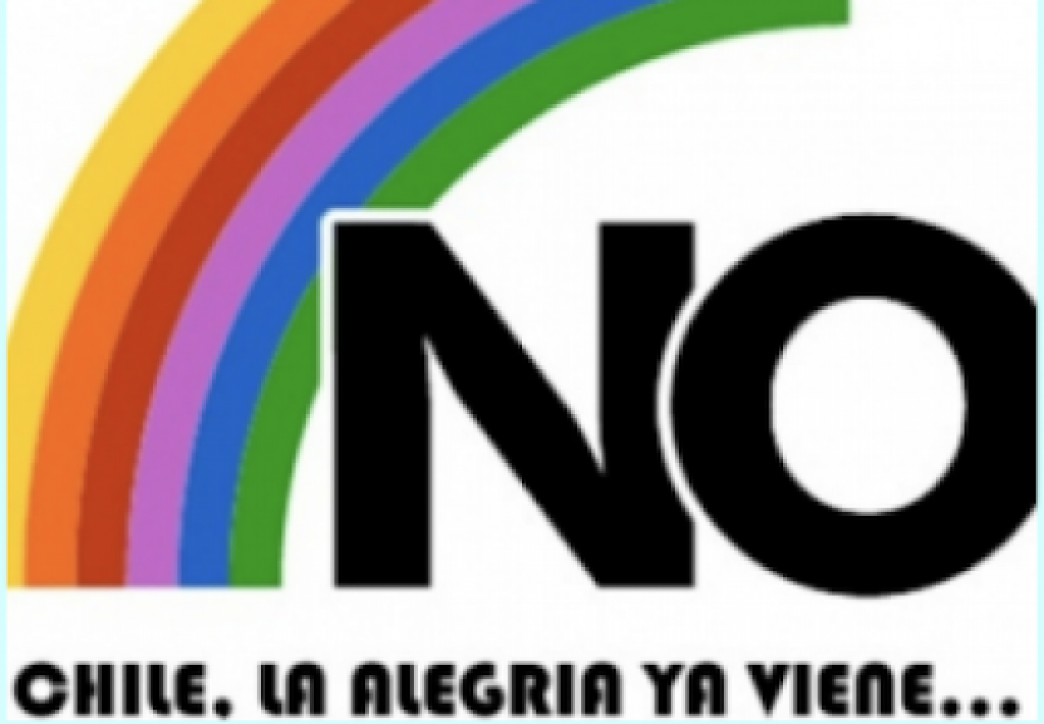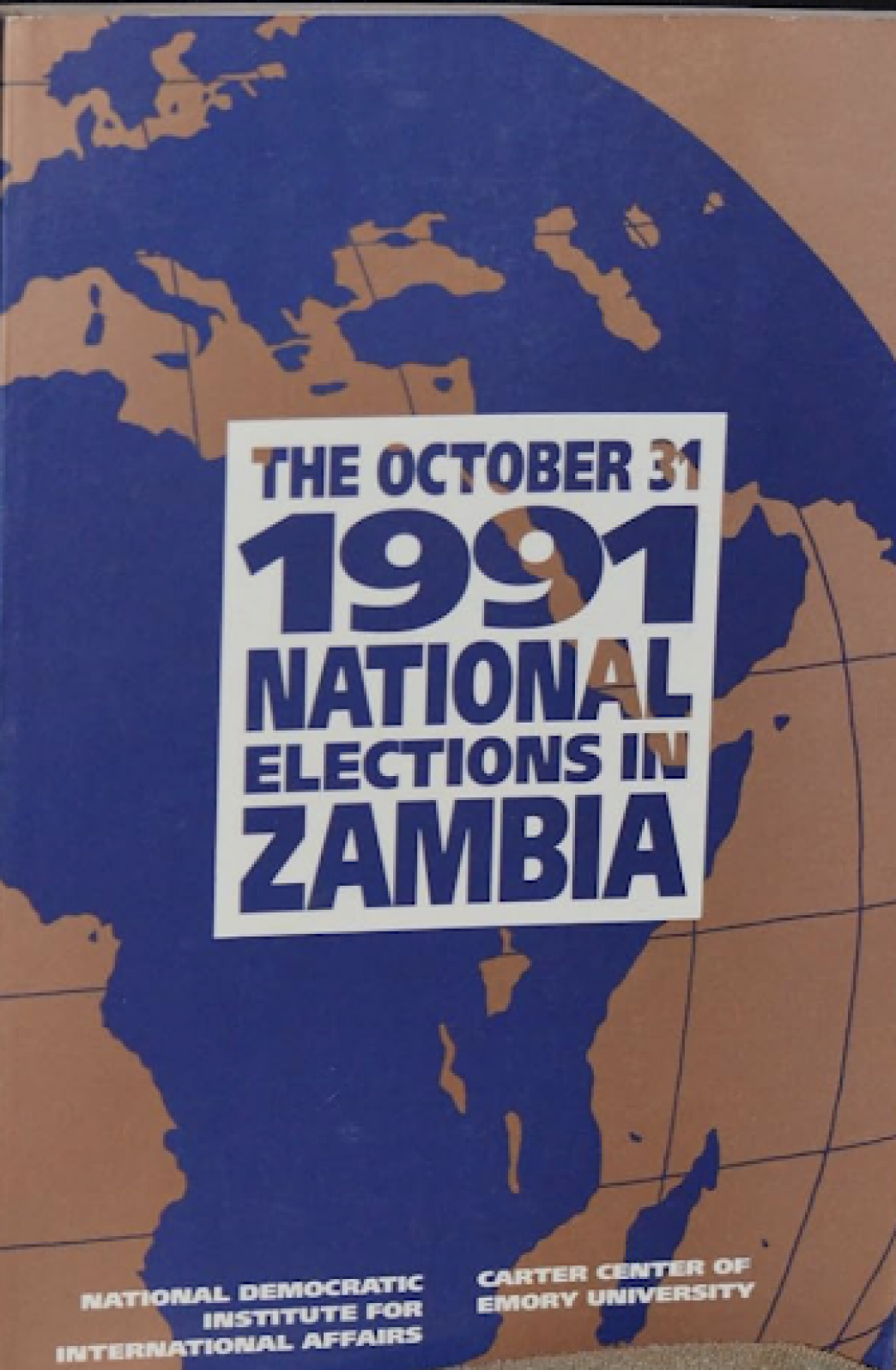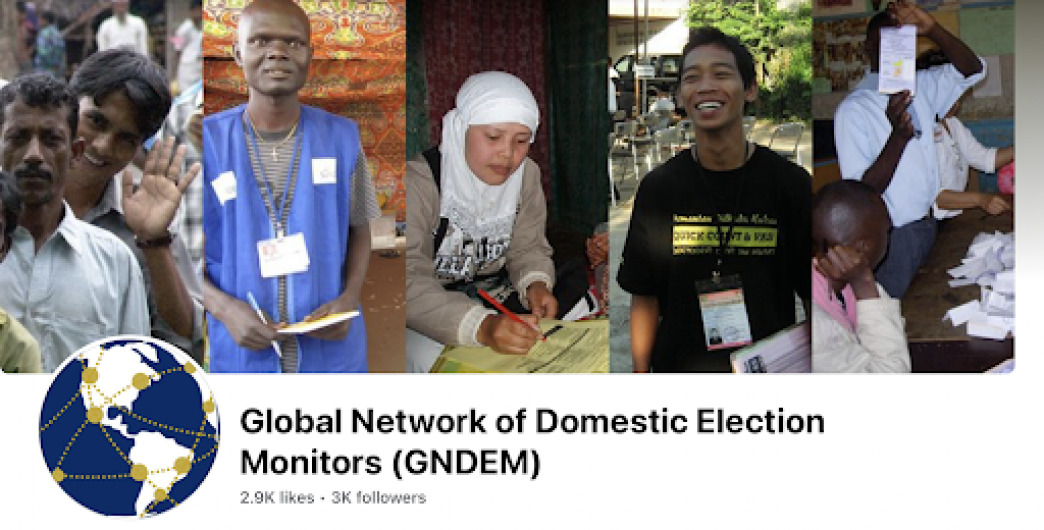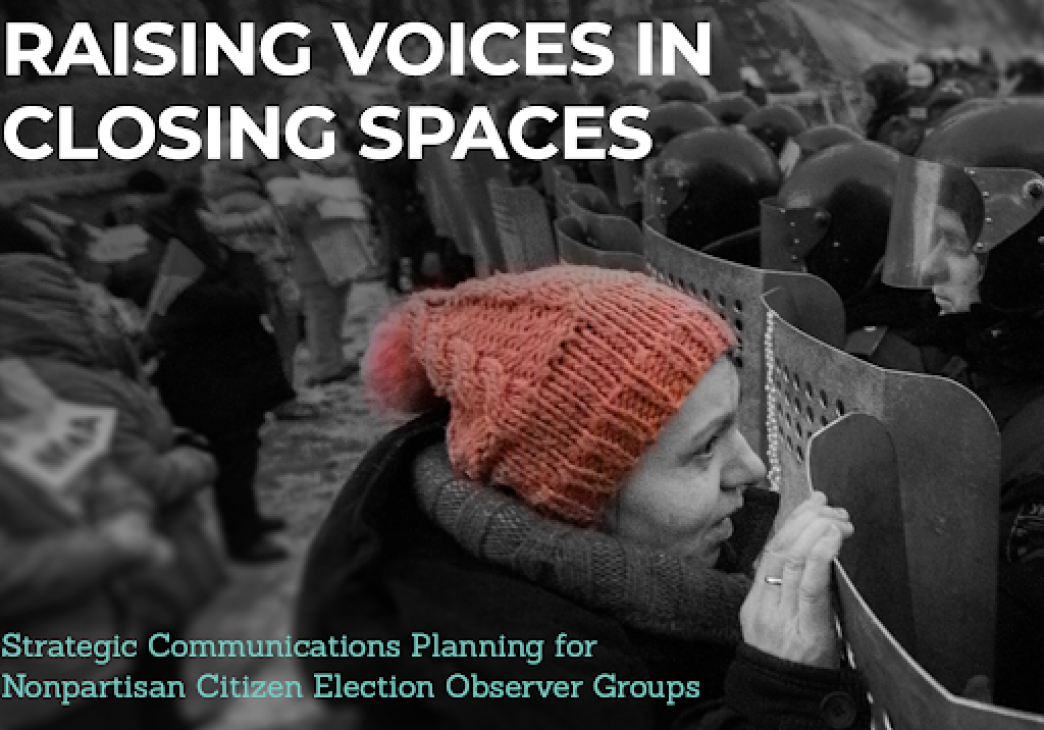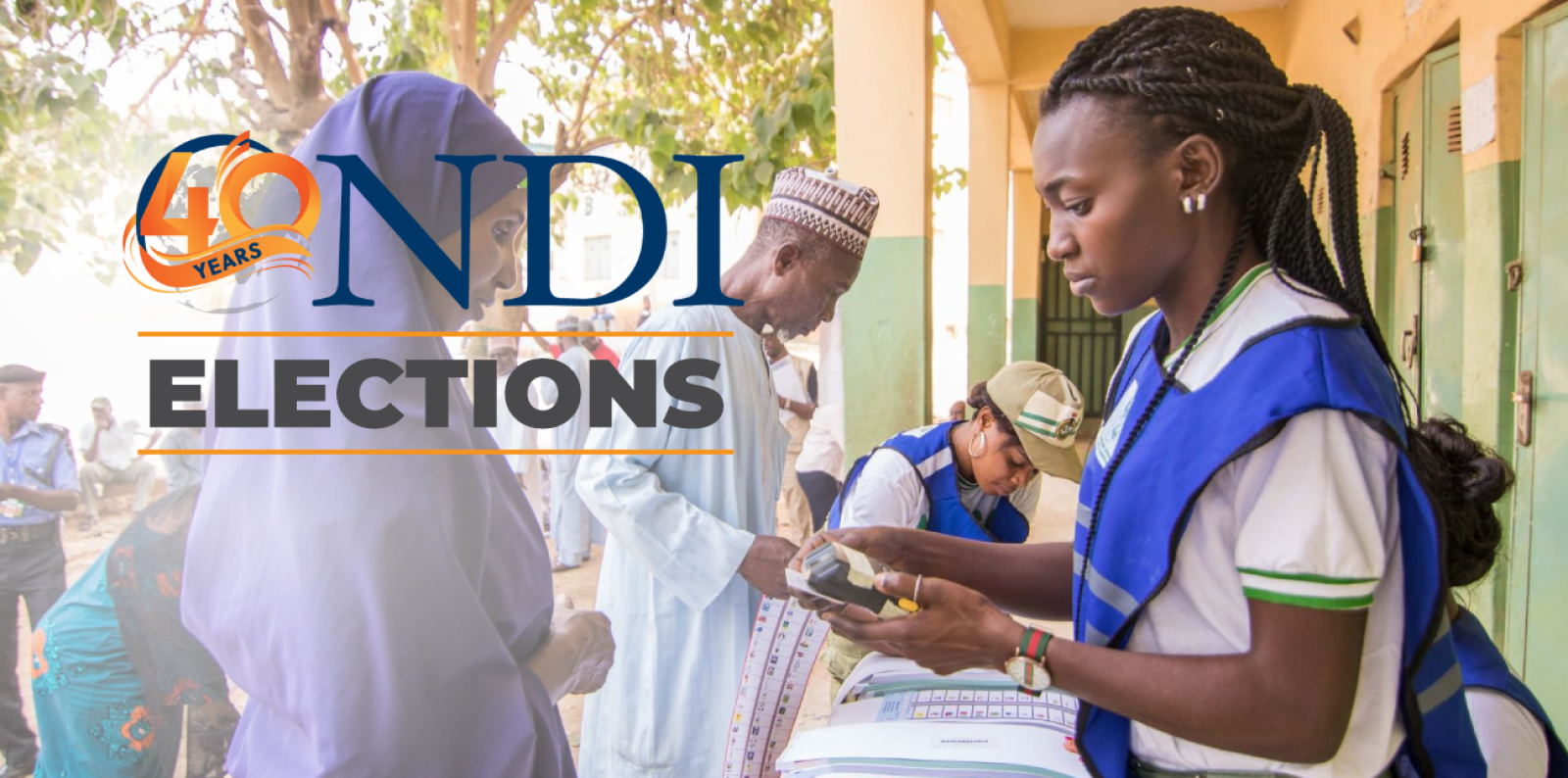
SHARE
ISSUES
In a democracy, the government is “of, by and for the people” – and genuine elections are about honoring the principle that the authority to govern flows from the people through universal and equal suffrage. Viewed holistically, elections are thus about people’s empowerment. They are a means of holding accountable those in government and endorsing policies of those who seek to be elected. Put succinctly, elections belong to the people, because they are an expression of popular sovereignty.
|
Defending Democratic Elections Over Four Decades 250+ NDI international election observation delegations to 56 countries and territories. 300+ Nonpartisan citizen election monitoring organizations, assisted in 90 countries that have mobilized more than 4,000,000 observers for over 450 elections and referenda. 170+ Parallel Vote Tabulations/Process and Results Verifications for Transparency (PVTs/PRVTs, also sometimes called Quick Counts or Sample-Based Observations-SBOs) successfully assisted in more than 50 countries; the methodology, based on nationally representative statistical samples, examines the integrity of voting and counting processes as part of determining the what an accurate election result should be. Declaration of Principles for International Election Observation, co-facilitator of initial process with UNEAD and The Carter Center, lead drafter and negotiator, now endorsed by 50+ international and intergovernmental organizations and an ongoing implementation process to address emerging challenges to democratic elections. Declaration of Global Principles for Nonpartisan Election Observation and Monitoring by Citizen Organizations, facilitator of drafting process along with UNEAD, now endorsed by over 250 citizen organizations and regional networks from more than 90 countries and territories. Supporter of the Global Network for Domestic Domestic Election Monitoring (GNDEM) and regional citizen election monitoring networks. Produced over a dozen best practice manuals and hundreds of supporting materials for citizen and international election monitoring and advocacy. |
Elections also demonstrate how a government relates to people, including securing equal protection for the exercise of everyone’s civil and political rights. They reveal how those competing for office treat each other and the electorate. Consequently, elections cannot be isolated from any country’s broader political, social, and economic dynamics, including the information environment.
These understandings have been confirmed over the decades since NDI’s earliest engagements. As a result, among its numerous election-related programs, NDI gives high priority to bolstering citizen election monitoring and electoral reform advocacy as well as international election observation and fostering international norms, standards, and practices for authentically democratic elections.
Because elections are an exercise of the people’s sovereign power, NDI has championed effectual nonpartisan citizen election monitoring and related advocacy for credible, peaceful elections - helping it to spread from one country in 1986 to more than 90 countries and territories today. Those citizen efforts have become a vital force in promoting and protecting democratic elections, sustained over numerous election cycles in many places. They also have expanded to address other essential governmental processes, thus strengthening responsive governance. In just four decades, effectual nonpartisan citizen election monitoring has become a “standard” or benchmark for democratic elections, as has credible international election observation. That citizen effort is an extraordinary accomplishment in democratic development.
Another hallmark of NDI’s efforts is fostering networks among citizen election monitors among international election observation organizations and connecting those two communities to further popular sovereignty through credible, peaceful elections. Such networking provides solidarity and support while furthering democratic norms.
All of these engagements interconnect to help reinforce a positive ecosystem for democratic elections and to counter authoritarianism’s global reach. There are dramatic examples of where such efforts saved, restored and/or advanced democracy, particularly where citizen initiatives were complemented by international actions. A few such early NDI engagements are highlighted below.
Exposing and Preventing Election Fraud from Negating the People’s Will
The Philippines’ 1986 Marcos-Aquino election and its People Power Revolution dramatically demonstrated the importance of citizen election monitoring and civic action in defending the people’s vote. It also illustrated the value of international election observation and informed, principled international action against election fraud.
That election was the first time NDI organized an international election observation mission. It was conducted jointly with the International Republican Institute (IRI), which was also IRI’s initial election observation experience. The joint mission adopted a politically impartial, holistic approach based on international human rights fact-finding techniques. It assessed the pre-election environment, election-day procedures, and immediate post-election developments, and it included a multi-national delegation with leaders of differing political tendencies and experts in elections and human rights. That approach both drew upon and contributed to accepted principles for international election observation, which aim at enhancing public confidence in electoral processes and deterring fraud while shining light on defects and recommending reforms.
The joint mission pointed to fundamental flaws in the electoral process. Equally significant, it appreciated the importance of the nonpartisan National Citizens’ Movement for Free Elections (NAMFREL), a nationwide election monitoring organization with ties to the Catholic Church and business community. NAMFREL fielded approximately 500,000 volunteer monitors to the country’s polling stations, who recorded voting results and forwarded them to NAMFREL’s headquarters. It tabulated the results in a “Quick Count”, which demonstrated that Marcos lost. That validated the more than a dozen brave computer operators from the national election commission who publicly proclaimed that the results were being rigged for a Marcos victory.
The country’s National Catholic Bishops’ Conference denounced the election as “the most fraudulent in Philippine history,” commended the honest computer operators and NAMFREL volunteers, and called for a nonviolent struggle to honor the people’s vote. When the legislature wrongly declared Marcos the electoral victor, hundreds of thousands of people came to the streets in events that rapidly led to Marcos leaving the country for exile in Hawaii. The NDI-IRI observation mission played a critical role in focusing international media attention on the attempted Marcos fraud and informing the U.S. Congress and administration, which contributed to a change in posture toward Marcos’ actions. (Please see NDI’s 1986 Philippines story for more details.)
Election monitoring safeguarded Chile’s 1988 vote against continued dictatorship. A broad center-left to center-right political alliance, the Comando para el No (NO Campaign) along with civic and religious groups, mounted massive voter registration and voter turnout initiatives that blocked General Augusto Pinochet from extending Chile’s military rule for eight additional years. The people’s vote of almost 56% against Pinochet was protected decisively by the NO Campaign’s poll watching and by nonpartisan election monitoring. Among other support for Chile’s democratic movement, NDI assisted those efforts and organized an independent international election observation mission, the findings of which reinforced their work.
The NO Campaign dedicated considerable effort to mobilizing poll watchers for all of the country’s 22,247 polling stations (mesas). They relayed vote counts from the mesas to the NO Campaign headquarters, where it tabulated results in its “Quick Count.” The newly formed nonpartisan Committee for Free Elections (CFE) sent observers to a nationally representative sample of 10% of the mesas. With NDI’s help, this was the first time that statistical principles were embraced by an independent citizen verification of official election results, an innovation that has been successfully employed over 170 times since in more than 50 countries. Observers rapidly relayed vote tallies so that CFE could complete a statistical projection of what, within a narrow margin of error, the official results should report (a parallel vote tabulation or PVT, now also known as a process and results verification for transparency or PRVT). The Quick Count and PRVT were both influenced by NAMFREL’s experience in the Philippines.On the night of the plebiscite, the official vote tabulation mysteriously stalled with the Yes vote ahead, even though an exit poll, the NO Campaign Quick Count and CFE’s PRVT each showed the No vote winning. Suspicion spread that the military junta was preparing to cancel the people’s vote. Indeed, Pinochet had a plan to provoke violence in the capital and to use emergency powers to void the plebiscite. NDI’s international election observer mission, as well as others in the international community, weighed in along with Chilean democrats to defend the vote.
NDI observer teams deployed across the country reported that the plebiscite had been properly conducted, and in visiting key stakeholders that night, the mission’s leaders learned of the Quick Count and PVT findings. In following meetings, the NDI delegation leaders - including former Spanish Prime Minister Alfofo Suárez, who played a critical role in Spain’s democratic transition, and former President of Colombia Misael Pastrana - stressed the importance of those result verifications. That included a meeting with the rightist National Renewal Party. Party leader Andres Allamand, who had been one of the Chileans on NDI’s 1987 delegation to the Philippines legislative elections, understood the importance of the Quick Count and PVT and appreciated the integrity of the NDI delegation. Later, when speaking by phone with military officials, Allamand stressed that while his party supported the Yes vote, it would not support a fraud by Pinochet.
Air Force Commander Fernando Matthei, when entering the presidential palace for an emergency junta meeting later in the night, told Chilean radio that “it appeared the ‘no’ had won.” Subsequently, the junta rejected Pinochet’s plan to evoke emergency powers, and official results were released showing the No vote’s victory. The vote prevailed based on the resounding voice of the people - 97% of Chile’s registered voters cast ballots, election authorities’ effective administration and credible citizen election monitoring, all with international confirmation. The outcome was historic, like the Philippines, and NDI incorporated lessons from both experiences in its future work. (Please see NDI’s 1988 Chile story for details.)
|
Helping to spread nonpartisan citizen election observation from one to more than 90 countries: NDI’s recognition that citizens need to secure the integrity of their elections led to bringing civic and political leaders from several countries to meet and learn from NAMFREL in conjunction with NDI’s observation of the 1987 Philippines legislative elections. The participants went home to help spawn nonpartisan citizen election monitoring in at least four countries: Chile, Haiti, Panama, and Paraguay. NDI assisted those efforts by bringing NAMFREL leaders and successively leaders of other efforts to additional countries, including Bulgaria in 1990, Zambia in 1991, Russia and Yemen in 1993. From each of those examples, NDI continually helped to spread nonpartisan citizen election monitoring to more than 90 countries through peer-to-peer exchanges, the development of peer expertise in various monitoring techniques, and eventually regional networks and a global network, GNDEM. Those efforts helped to develop independent, sustained election monitoring and election integrity advocacy in scores of countries, while many election monitoring initiatives have used their skills and organizational strengths to engage in activities beyond elections that promote transparent, accountable and inclusive governance. |
Panama, in 1989, General Manuel Noriega’s fraudulent annulment of elections in order to cling to power was exposed by citizen election monitors through an independent verification of the vote tabulation (a PRVT), which was assisted by NDI. The PRVT demonstrated that the opposition presidential candidate won the election. The citizen effort was led by a Catholic Church laity initiative, influenced by Panamanian activists who had joined NDI’s 1987 observer delegation to the Philippines legislative elections. The PRVT’s impact was bolstered by its endorsement by the Catholic Episcopal Conference and by a joint NDI-IRI election observation mission led by former US Presidents Jimmy Carter and Gerald Ford, which, based on its observer reports and confidence in the PRVT, publicly endorsed the opposition’s victory. Diplomatic efforts of the Organization of American States and US actions subsequently led to the removal of Noriega and the restoration of democracy. (Please see the election mission’s report for details.)
In the Dominican Republic, the fraudulent manipulation of 1994 voter registration lists on election day disenfranchised thousands of opposition voters, apparently reversing the presidential election’s outcome. The suffrage denial and likely consequences were exposed by NDI and other international election observers. Joaquín Balaguer’s fraudulent victory led to legislators amending the country’s constitution, truncating his term and holding reformed elections in 1996. (See NDI’s Interim Report for details.) As the fraud was unfolding, NDI delegation leaders met with the opposition presidential candidate José Francisco Peña Gomez and his advisors. The NDI team told them that the delegation would let the world know what was happening and encouraged them to seek peaceful redress. Later, Peña Gomez reported to the 1996 joint NDI-Carter Center election observation mission that, as a result of the 1994 NDI pledge, his team canceled a planned general strike to avoid likely violence and loss of life. There were no nonpartisan citizen election monitors for the 1994 elections. Subsequently, with NDI assistance, citizen monitoring (including PRVTs) has played an important role in that country’s elections.
Enhancing Public Confidence in Credible, Peaceful Elections
The validity of Bulgaria’s 1990 elections was confirmed by observers who noted flaws. The elections were monitored by the nonpartisan Bulgarian Association for Fair Elections (BAFE). BAFE, with NDI assistance, conducted a PRVT to independently verify the integrity of results for the proportional representation seats of the Grand National Assembly (GNA, which was to draft a democratic constitution). The GNA elections also included single-member district seats for which observation was conducted. International election observers included a joint NDI-IRI observation mission.
The ruling former communist party managed a surprise parliamentary plurality, unlike the electoral outcomes in other Warsaw Pact countries. That caused suspicion and an immediate gathering of protesters in the capital while security forces moved toward a potentially violent confrontation. BAFE’s findings demonstrated that the official results were properly tabulated, and even though many of its leaders disliked the outcome, they publicly confirmed the validity of the vote count. That diffused the potential confrontation.
The NDI-IRI observation mission, like other international observers, noted the vast advantages of the ruling party, particularly in the short pre-election period in a country dominated by prior one-party rule. They also noted credible allegations of voter intimidation and weakness of secret ballot guarantees. However, they recognized that the parties were able to vigorously contest the elections, communicating their messages to the electorate. The NDI-IRI mission, like other international observers, concluded that the serious flaws in the election process did not invalidate the electoral outcome. Opposition leaders later stated that they may not have accepted the outcome had BAFE not spoken out and international observers offered their assessments.
In 1991, nonpartisan and international observers bolstered public confidence in Zambia’s elections. They were the country’s first multiparty elections since 1968, and Kenneth Kaunda had been Zambia’s President since its independence in 1964. Following a sometimes highly contentious process, a new constitution, promulgated in August 1991, set multiparty elections for October 31 of that year. Many Zambians were skeptical that the ruling party would give up power, and the limited timeframe led many to doubt that fair competition was possible.
Though objections were raised by some in his party, President Kaunda invited international observers, including a joint Carter Center-NDI mission dubbed “Z-Vote”, and allowed nonpartisan citizen election monitoring. That set a precedent for African elections. Two main citizen monitoring initiatives emerged: the Zambian Independent Monitoring Team (ZIMT); and the Zambian Election Monitoring Coordinating Committee (ZEMCC). NDI and The Carter Center assisted both initiatives as they developed their monitoring and advocacy approaches. That included bringing in pro bono experts from other countries where nonpartisan election monitoring played important roles, including the Philippines and Chile.
Z-Vote organized three pre-election assessments, maintained a continuous presence in the leadup to the elections, and fielded election-day observers from 12 countries in a delegation led by President Carter. ZEMCC and ZIMT conducted large-scale voter education efforts and advocated for improvements in the election process, including Z-Vote’s pre-election recommendations. A number of recommendations were accepted by the election commission. That gave Zambians confidence that the process was being scrutinized with positive results. When opposition candidate Frederick Chiluba won almost 76% of the vote, and the opposition took a majority of parliamentary seats, President Kaunda, though encouraged by some to cling to power, graciously accepted the outcome, and Mr. Chiluba magnanimously commended him. The peaceful and collegial transfer of presidential office and transition from one-party rule resonated across the Continent and around the world. (Please see the Z-Vote report for details.)
Pakistan’s 1990 legislative elections generated considerable controversy. After the death of General Muhammad Zia-ul-Haq in 1988, Benazir Bhutto became Prime Minister as a result of credible elections, which were observed by NDI. In 1990, her government was dissolved in a controversial action that was upheld by the courts. When her party lost the 1990 elections, it claimed the elections were rigged. NDI’s 1990 international election mission, which conducted pre-election analysis, election-day observation, and extensive results analysis, concluded that irregularities and manipulation did not change the result of the election. That finding contributed to confidence in the outcome. The Institute worked with parties on pollwatching techniques and encouraged the development of nonpartisan citizen election monitoring leading to the 1993 elections. (Please see NDI’s report for details.)
Georgia’s 1992 elections were held under exceptionally strained conditions. After achieving independence in 1991, Soviet dissident Zviad Gamsakhurdia became the country’s first democratically elected president but was ousted by a coup in early 1992. A separatist war was taking place in Georgia’s Abkhazia region, with unrest elsewhere and boycotts by some of Gamsakhurdia’s supporters. Nonetheless, Georgian voters embraced the 1992 elections enthusiastically, and the electoral processes were credibly conducted. Nonpartisan citizen election monitoring had not yet developed in Georgia, and the relatively positive findings of NDI’s mission and other international observers helped to confirm confidence in the elections. (Please see the NDI statement for details.) NDI’s pre-election assessment stressed the importance of Georgian political parties and citizens to build the national capacity to monitor and advocate for electoral credibility. (Please see the pre-election assessment for details.) The Institute later helped parties do so and assisted in the formation of nonpartisan citizen election monitoring in Georgia, notably the International Society for Free Elections and Democracy (ISFED), which has played an important role in elections and broader civic activities.
Building Norms and Networks to Bolster Genuine Elections and Reinforce Democracy
NDI’s election observation methodology evolved to meet emerging challenges. When NDI mounted its first international election observation mission in 1986 to the Philippines, it designed its methodology based on the 1984 Guidelines for International Election Observation, which were the result of expert consultations organized by the International Human Rights Law Group. The NDI methodology, from its beginnings, took a holistic approach, examining multiple factors in a country’s political environment and electoral processes from early pre-election, election-day, and post-election periods. It also included offering practical recommendations for improving the credibility of elections in the immediate and longer term.
Almost 40 years of experience in 56 countries and over 250 observer delegations, plus advancing long-term observation and assessments, confirm the initial approach. The methodology remains steadfastly politically impartial, adapting human rights fact-finding techniques, engaging political leaders from different countries and democratic ideologies in observer delegations, and incorporating, with gender balance, electoral experts and civic leaders from multiple countries with relevant country and regional expertise. From 1986 onward, NDI evolved its election observation methodology to address both continued and emerging challenges to electoral integrity, engage credible national stakeholders and contribute to improving electoral and broader political processes. From its beginnings, NDI also built consensus and cooperation among international and citizen election observers.
The Declaration of Principles for International Election Observation and its implementation process has a global impact. NDI was co-convenor with the UN Electoral Assistance Division (UNEAD) and The Carter Center, and it was the lead drafter and negotiator of a four-year process that led to the Declaration of Principles for International Election Observation (DoP). The DoP was launched in 2005 at the UN Secretariat and now has more than 50 endorsers among international and intergovernmental organizations. Its ongoing implementation process includes a Convening Committee of the core election observation organizations, which regularly communicate, cooperate on specific observation missions, and develop methodology papers to evolve best practices to meet emerging challenges.
The DoP has been recognized with appreciation in multiple UN Secretary-General reports and General Assembly resolutions. The principles set forth in the declaration and related methodologies reflect and reinforce norms and practices for democratic elections, and it has been used by observers when engaging with countries on five continents. The enhanced coordination among DoP endorsers has evolved into an important international network that takes enhanced practice to all regions of the globe. For decades, NDI has also facilitated dialogue and cooperation among DoP endorsers and nonpartisan citizen election monitors, evidenced, for example, by the 2022 joint Communique of the DoP endorsers and Global Network of Domestic Election Monitors.
NDI’s supporting nonpartisan citizen election monitoring and facilitating their networks fostered a global citizens’ movement for electoral integrity. In 1986, there was one notable nonpartisan citizen election monitoring organization in the world, NAMFREL. NDI introduced civic and political activists from several countries to NAMFREL in the Philippines, and its leaders joined NDI efforts to help foster citizen election monitoring and advocacy in other parts of the globe. Over the decades, NDI helped more than 300 organizations and coalitions in 90 countries and territories take on monitoring and advocating for electoral credibility, the vast majority of which evolved to work independently and continue today.
With each successful country effort, NDI encouraged peer networking for solidarity and technical support among monitoring groups. As citizen election monitoring quickly spread, NDI honed methodologies and shared innovations with them. The networking assisted the development of regional associations in Africa, Asia, Central Europe and Eurasia, Latin America and the Caribbean, and the Middle East and North Africa.
In 2009, based on relationships with those regional networks and over 200 citizen election monitoring organizations in more than 80 countries, NDI helped the organizations found the Global Network of Domestic Election Monitors (GNDEM), which encompasses over 250 organizations and coalitions in 89 countries and territories, including nine regional networks. It provides solidarity to election monitors facing harassment, shares experiences, and speaks for the more than 4,000,000 citizens around the globe who stepped up to monitor their elections. Together with DoP endorsers, GNDEM leaders successfully advocated for UN Special Rapporteurs to embrace election observers as subject to the protections of human rights defenders. GNDEM also hosts the 2012 Declaration of Global Principles for nonpartisan citizen election monitoring, which, like the DoP, has been recognized by UN documents.
NDI publications advance election monitoring to defend the people’s vote. Also, from its earliest days, NDI published materials to buttress electoral norms and enhance monitoring techniques. That includes more than a dozen best practice handbooks on various systematic nonpartisan monitoring techniques from general organization and strategic communications to specifics, including legal frameworks, election-day processes and results verification, monitoring the media, disinformation, voter registration, electoral technologies, electoral violence monitoring - including violence against women, open electoral data principles, and more.
Besides playing a leading role in promulgating the DoP and outputs of its implementation process (including employing a gendered lens in election monitoring, addressing the effects of disinformation, and impacts of new technologies), NDI, along with the UNEAD facilitated the process leading to issuing of the Declaration of Global Principles for nonpartisan citizen election monitoring. Plus, the body of NDI pre-election assessments and overall election reports in various countries going back to 1986 serves as a touchstone for electoral reformers.
Building norms and networks complement one another and directly support citizen and international actions to bolster genuine elections and secure democracy. Popular democracy, by definition, is citizen-centric, and citizens of each nation draw on others in a world of increasingly rapid communications and challenges for building confidence in the credibility of elections - which is crucial to the success of democratic governance.
Author: Pat Merloe, Strategic Advisor to NDI
Related Stories:
Women’s Political Leadership: A Founding Focus
NDI: Standing with Democracy over Military Dictatorship - Chile’s 1988 Presidential Plebiscite
###
NDI is a non-profit, non-partisan, non-governmental organization that works in partnership around the world to strengthen and safeguard democratic institutions, processes, norms and values to secure a better quality of life for all. NDI envisions a world where democracy and freedom prevail, with dignity for all.
